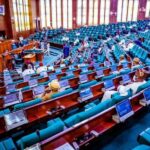
The Reps in its bid to probe has asked the Federal Character Commission to submit a report of appointments in Ministries, Departments, and Agencies between 2015 and 2023.
The Green chamber passed the resolution during the plenary session on Tuesday following the adoption of a motion sponsored by Paul Nnamchi, a Labour Party lawmaker from Enugu.
During his tenure as president, Buhari was accused by critics of alleged lopsidedness in the appointment of people to head government offices negating the principle of federal character.
But Buhari dismissed the claim at the time, stating that those he appointed “earned it”.
While moving the motion, the lawmaker said the essence of the federal character principle was to promote national cohesion and equal opportunities.
Nnamchi said, “Twenty-four years after its constitutional entrenchment, the perception is that there exists brazen domination of the bureaucratic, economic, media, and political posts at all levels by a section of the country at the expense of the others.”
The lawmaker also claimed that there is a “clash of interests” among the commissioners at the commission.
He added, “Federal Character Commission has virtually abdicated its constitutional and statutory responsibilities and degenerated into personality clash of interest among its commissioners as was the case about a year ago.”
The motion was adopted when it was put to a voice vote by the Deputy Speaker, Benjamin Kalu.
The House, therefore, resolved to set up an ad hoc committee, to among other things, request the commission to forward “the returns on appointments undertaken by ministries, departments and agencies under its jurisdiction between 2015–2023.”
Section 14(3) of the 1999 constitution mandates government agencies to reflect the federal character principle in the conduct of their affairs to promote national unity.
The section states, “The composition of the Government of the Federation or any of its agencies and the conduct of its affairs shall be carried out in such a manner as to reflect the federal character of Nigeria and the need to promote national unity, and also to command national loyalty, thereby ensuring that there shall be no predominance of persons from a few states or from a few ethnic or other sectional groups in that Government or in any of its agencies.”





